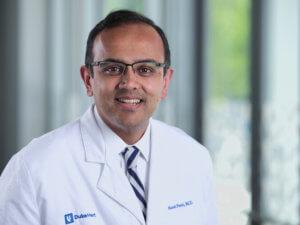
New results from the one-year follow up of the DEFINE-PCI trial shed light on how to optimize care for patients who have undergone percutaneous coronary intervention (PCI).
The results, presented as late-breaking science by DCRI’s Manesh Patel, MD, were shared virtually Thursday at the 2020 Transcatheter Cardiovascular Therapeutics (TCT) Connect.
The one-year follow up for DEFINE-PCI sought to assess changes in angina frequency at one year post-procedure, as well as assess rates of clinical events, including cardiovascular death, myocardial infarction, and target vessel revascularization.
Previous trials have shown that 20 to 30 percent of patients experience recurrent angina one year after undergoing PCI. Of the 480 patients who underwent successful PCI in the DEFINE-PCI population, 24 percent experienced significant residual ischemia. In a large majority of these cases, residual pressure gradients were focal and potentially treatable with additional PCI.
The study team also performed analysis to determine whether a specific instantaneous wave-free ratio (iFR) value after PCI would be associated with improved patient outcomes. This post-hoc analysis found that a post-PCI iFR value of 0.95 or higher was associated with fewer clinical events and improvement in angina.
Of those patients in the DEFINE-PCI population who had a post-PCI iFR score of 0.95 or higher, 1.8 percent experienced adverse clinical events within 12 month. In comparison, of those with scores less than 0.95, 5.7 percent of patients experienced adverse outcomes.
“These results show that although PCI is a highly successful procedure, we have more work to do to optimize patient care and improve outcomes,” Patel said. “In the DEFINE-PCI population specifically, 112 patients had a post-PCI iFR of less than 0.90. This one-year follow up raises interesting opportunities in the way to use coronary physiology and iFR. Specifically, we have used it to date to determine when to do PCI, and now we are reviewing using it to study how to revascularize patients. The clinical effectiveness of using this measure to identify and eliminate ischemia after PCI will be studied in the prospective DEFINE-GPS trial.”
Attendees to TCT Connect 2020 can also join on Friday morning as Patel participates in a discussion of the results.